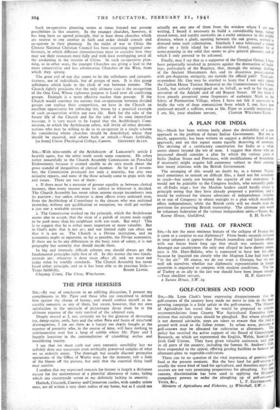SIR,—With nine-tenths of the Archdeacon of Lancaster's article I heartily
agree, but the other tenth needs some comment. He refers rather mournfully to the Church Assembly Commission on Parochial Endowments because it seemed unable to do very much about the gross scandal of inequalities of clerical incomes As far as I remem- ber, the Commission produced not only a majority, but also two minority reports, and none of the three actually came to grips with the real issues. There are two of them: 1. If there must be a measure of greater equality as between clerical incomes, then every income must be subject to whatever is decided. The Church Assembly has never taken anyone except incumbents into its purview ; but unless whatever is done affects every ordained man, from the Archbishop of Canterbury to the deacon who was ordained yesterday, without any qualification or exception, we shall get neither a just nor a workable system.
2. The Commission worked on the principle, which the Archdeacon seems also to accept, that the vicar of a parish of to,000 souls ought to be paid more than his neighbour with too souls. But why? This is to suggest that he is either more important or more valuable. But in God's sight that is not so ; and our limited sight can often see that it is not so. The Church is a Divine institution, and its economics ought to represent, so far as possible, the Divine economics. If there are to be any differences in the basic rates of salary, it is not geography but seniority that should decide them.
In big and intensely difficult reforms one should always get the fundamental principles right first of all. In this matter the two funda- mentals are: whatever is done must affect all, and, we must not judge value by worldly standards. The Church Assembly has never faced either principle, and so it has been able to do precious little.—
Yours faithfully, ROGER LLOYD. Cheyney Court, The Close, Winchester.






























 Previous page
Previous page